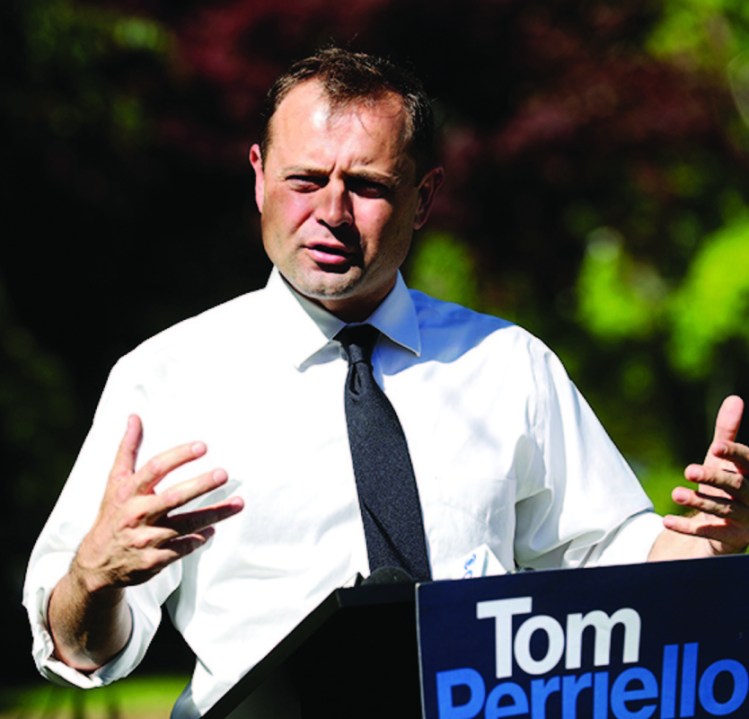The June 20 Georgia special congressional election will offer an early reading on the Democrats’ ability to rebound from 2016 and make 2018 gains. But next week’s Virginia primary will provide an insight into the future of their party and two of its key figures.
The gubernatorial contest features a bid by a self-identified “proud progressive,” former Rep. Tom Perriello, to continue last year’s anti-establishment successes by upending Lt. Gov. Ralph Northam, anointed by the entire state Democratic establishment.
But their duel, which polls suggest is likely to pick the state’s next governor, is also a proxy contest between Vermont Sen. Bernie Sanders, who has backed and campaigned for Perriello, and outgoing Gov. Terry McAuliffe that could affect the party’s 2020 presidential nomination.
Sanders’ interest in the 2020 race, whether as a candidate himself or as the influential head of his growing organization, is evident. But there has been less attention given to the fact that McAuliffe, coming off a successful tenure in a state lately tending more Democratic, seems also to have his eye on 2020.
Governors have always made successful presidential candidates and, in a field that could be dominated by septuagenarians like Sanders, Joe Biden and Elizabeth Warren and African-Americans including Sens. Cory Booker and Kamala Harris, supporters think the genial, backslapping Virginia governor might be able to emerge as a formidable rival.
Because of recent losses, Democrats have few big-state governors likely to be in the field. One who is reportedly eyeing 2020, New York’s Andrew Cuomo, may be a bad fit for the retail politicking that is so important in Iowa and New Hampshire. McAuliffe’s closeness to Bill and Hillary Clinton means access to their formidable political and financial network, though those ties may be more of a handicap than a blessing.
In Virginia, meanwhile, Perriello’s unexpected entry into the governor’s race challenged the 60-year-old governor’s plan to place an ally at the helm of a state that limits governors to a single four-year term. Perriello, 42, served a single House term before losing his Charlottesville-area seat in the Republican sweep of 2010.
He is running the classic outsider campaign, vowing to shake up the status quo in Richmond, where many issues such as expanding Medicaid and revamping transportation funding have been stalemated between the Democratic governor and a Republican legislature that strengthened its position by drawing favorable districts.
Though he supported Clinton last year, Perriello’s message has attracted the support of Sanders, who has sought, with mixed success, to transform the national Democratic Party. And no one is as emblematic of the status quo as McAuliffe, national party chairman from 2001 to 2005.
Polls show the race is close. Both candidates have moved left to fit within the more aggressively liberal Democratic Party of the Trump era. Perriello, a strong Barack Obama supporter whose 2010 defeat may have been at least partly due to supporting Obamacare, has said he was wrong in breaking with liberal orthodoxy to vote to limit abortion coverage in private health plans.
Northam, 57, a pediatric neurologist and former Army physician from Virginia’s conservative eastern shore, voted twice for Republican President George W. Bush, something he attributes to being “under-informed” before entering politics.
They’ve campaigned as much against Trump as one another: Perriello vows to make Virginia “a firewall” against Trump, and Northam has lately run an ad labeling him a “narcissistic maniac.” A Democratic candidate for lieutenant governor, former Joe Biden aide Susan Platt, one-upped both by calling for the president’s impeachment.
Some Democrats initially feared the Yale-educated Perriello might be seen as too liberal, given the state’s conservative political tradition. But an influx of highly educated suburbanites and the growth of African-American voting have enabled Democrats to win most recent statewide races, and polls don’t show any such weakness.
In the GOP primary, Ed Gillespie, a veteran Republican operative and Washington lobbyist who narrowly lost a 2014 Senate bid, leads a more outspoken conservative rival, Corey Stewart.
But polls show Gillespie trails both Democrats by double digits, in part due to Trump’s unpopularity.
For Sanders, the Democratic primary is one in a series of contests in which he is seeking to expand his influence in the party.
But two 2016 Sanders supporters lost in recent special congressional elections, and other backers of the Vermont senator narrowly lost bids to chair the California and national Democratic parties.
Besides, the primary may be more meaningful for McAuliffe, since failure to install a friendly successor in Richmond could, at the least, complicate his long-shot 2020 hopes.
Send questions/comments to the editors.



Success. Please wait for the page to reload. If the page does not reload within 5 seconds, please refresh the page.
Enter your email and password to access comments.
Hi, to comment on stories you must . This profile is in addition to your subscription and website login.
Already have a commenting profile? .
Invalid username/password.
Please check your email to confirm and complete your registration.
Only subscribers are eligible to post comments. Please subscribe or login first for digital access. Here’s why.
Use the form below to reset your password. When you've submitted your account email, we will send an email with a reset code.